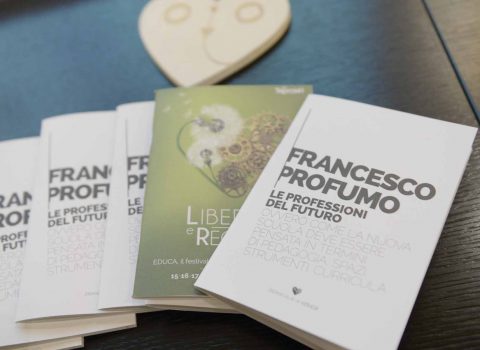
AquilAir Project’s Closing Event
The closing event of the AquilAir project was held on December 12, 2023 at the Gran Sasso Science Institute in L'Aquila, Italy, that involved four schools in Abruzzo applying the Domosens innovative educational model devised by Fondazione Bruno Kessler and already activated in previous years in Trentino
The AquilAir project was realized thanks to the support of the Carispaq Foundation, and the collaboration of the Gran Sasso Science Institute (GSSI), the University of L’Aquila, the National Institute of Geophysics and Volcanology (INGV) and the Gran Sasso Tech Foundation (GST).
Four L’Aquila based high schools specializing in different areas participated:
- – Convitto Nazionale Domenico Cotugno (Classical studies and Economic Social High School),
- – IIS Andrea Bafile (sciences high school and arts high school),
- – IIS Da Vinci – Colecchi (Technical Construction, Environment and Local Area) and
- – IIS Amedeo D’Aosta with five of its spevialization courses.
Each school fielded its own expertise, as stipulated in the educational model, and participated with at least one class, working on specific actions inherent to the school’s main vocation. Thus, a supply chain was created that covered the innovation program: from research to product/service on the market. At the end of the program, the students developed an air quality monitoring system composed of a network of low-cost detectors of strong interest to the current market. The electronic components of the detector were studied, and in the case of the sensor, the sensing part was made in the laboratories of the schools involved. In addition, the project addressed issues related to the study of the market, tentative business plan, and communication, always keeping in mind the relevant city context. The experimentation with multidisciplinarity and cooperation among different schools, elements that are now indispensable in working environments, as well as the presence of professional tutors on each part characterizing the activities were some of the relevant aspects of the educational experience carried out with AquilAir.
The project, supported by the Ministry of Education and Merit through the Regional School Office, revealed the excellent level of education in L’Aquila’s schools. The activity involved innovative teaching methodologies such as Cooperative Learning and Problem Based Learning. Thus, this experience represents an innovative model of PCTO [the Italian school-to-work program, EN], realized through horizontal cooperation with the world of work and with the networking by the four schools involved.
“The working methodologies put in place,” said the Director General, Massimiliano Nardocci, “have made it possible to achieve excellent results in terms of learning, but also in terms of combating school dropout since they have encouraged student central role and increased motivation.
Also involved in the implementation of the AquilAir project was ARTA Abruzzo (Regional Agency for the Protection of the Environment), which operates certified control units in the area, essential for the calibration of those in the realization of which the schools worked, which in turn were copies of those resulting from FBK’s research.
The Gran Sasso Science Institute collaborated in the part of the installation of the control units and the analysis of the environmental context, the University of L’Aquila for the meteorological and climatic aspects and for the analysis of the data acquired, and the National Institute of Geophysics and Volcanology (INGV) as local support for the management of the project and as tutor for the Radon gas measurements in the Stiffe Caves. In this regard, given the type of detectors needed, the project was able to rely on the commercial systems made available by the company Nuvap. The Industrial Design Association (ADI – Veneto and Trentino – Alto Adige section) contributed to the realization of the project’s logo, while issues related to the protection of intellectual property and trademarks were addressed by attorney Paolo Oliva from Pisa. Finally, for the study of the business plan, support was provided by Leonardo Benuzzi, innovation manager from Trento. The research institutions involved (FBK, INGV, UnivAq, GSSI and GST) signed an agreement to be able to continue this kind of experience in the Abruzzo region in the coming years.



